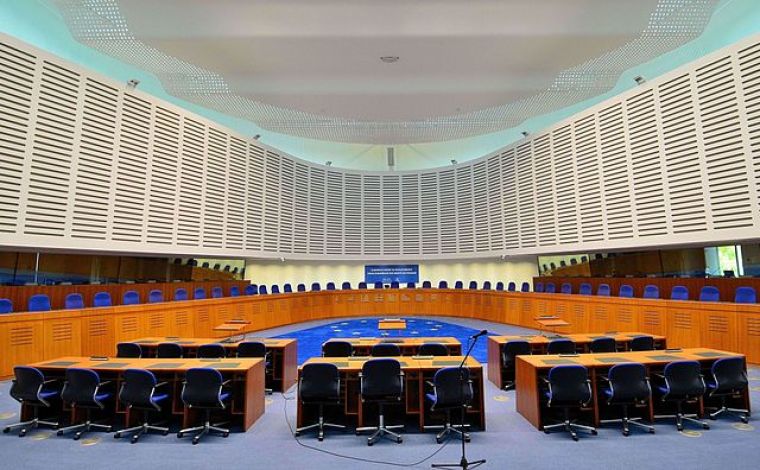US pastor challenges Russia's 'anti-missionary' law at European Court of Human Rights

An American Baptist missionary, who was fined for holding weekly Bible studies in Russia, has taken his case to the European Court of Human Rights to appeal the severe sanctions imposed by the country's "anti-missionary" law.
Donald Ossewaarde was the first U.S. missionary to be charged under Russia's "Yarovaya" law that was introduced in July 2016. He was fined 40,000 rubles ($600) after he was found guilty of conducting illegal missionary activities for hosting Sunday morning Bible studies at his home in the Russian city of Oryol.
The "Yarovaya" law, named after one of its authors, was introduced as an "anti-terrorism" measure, which allows the government to monitor extremist groups, according to World Watch Monitor.
Ossewaarde had already made several appeals, including one to the Russian Supreme Court, but his efforts have been unsuccessful. On Wednesday, he filed an appeal to the European Court of Human Rights, with the help of ADF International, a legal organization advocating for religious freedom.
"Freedom of religion is one of the most fundamental rights. Nobody should be persecuted because of their faith. Despite the Russian Constitution guaranteeing freedom of conscience and religion for all, Donald Ossewaarde has been charged with a criminal offence for holding a peaceful Church service in his own home," said ADF International Legal Counsel Laurence Wilkinson.
"His conviction is a hugely concerning development for religious freedom across Russia in general, and for Christian missionaries in particular," he added.
He noted that the appeal to the European court represents a "last resort" in challenging the Russian law.
"As a signatory to the European Convention on Human Rights, the Russian government should reconsider the scope of its counter-terrorism laws to guarantee the right to freedom of religion for all of its inhabitants," Wilkinson continued.
Wilkinson, who is the leading lawyer on Ossewaarde's case, noted that while the law was intended at preventing terrorist activity, it had a "devastating" effect on religious activities that cannot be considered dangerous in any sense.
Ossewaarde has previously stated that the Russian court refused his request to allow time for his lawyers to come from Moscow for the initial hearing. The court appointed another lawyer who advised him to accept the verdict and pay the fine without appeal. The lawyer also told the pastor that it would be better for him to leave the city because anything could happen to him and his family.
 Christians don't have to affirm transgenderism, but they can’t express that view at work: tribunal
Christians don't have to affirm transgenderism, but they can’t express that view at work: tribunal Archaeology discovery: Medieval Christian prayer beads found on Holy Island
Archaeology discovery: Medieval Christian prayer beads found on Holy Island Presbyterian Church in America votes to leave National Association of Evangelicals
Presbyterian Church in America votes to leave National Association of Evangelicals Over 50 killed in 'vile and satanic' attack at Nigerian church on Pentecost Sunday
Over 50 killed in 'vile and satanic' attack at Nigerian church on Pentecost Sunday Ukrainian Orthodox Church severs ties with Moscow over Patriarch Kirill's support for Putin's war
Ukrainian Orthodox Church severs ties with Moscow over Patriarch Kirill's support for Putin's war Islamic State kills 20 Nigerian Christians as revenge for US airstrike
Islamic State kills 20 Nigerian Christians as revenge for US airstrike Man who served 33 years in prison for murder leads inmates to Christ
Man who served 33 years in prison for murder leads inmates to Christ


 Nigerian student beaten to death, body burned over ‘blasphemous’ WhatsApp message
Nigerian student beaten to death, body burned over ‘blasphemous’ WhatsApp message 'A new low': World reacts after Hong Kong arrests 90-year-old Cardinal Joseph Zen
'A new low': World reacts after Hong Kong arrests 90-year-old Cardinal Joseph Zen Iran sentences Christian man to 10 years in prison for hosting house church worship gathering
Iran sentences Christian man to 10 years in prison for hosting house church worship gathering French Guyana: Pastor shot dead, church set on fire after meeting delegation of Evangelicals
French Guyana: Pastor shot dead, church set on fire after meeting delegation of Evangelicals ‘Talking Jesus’ report finds only 6% of UK adults identify as practicing Christians
‘Talking Jesus’ report finds only 6% of UK adults identify as practicing Christians Mission Eurasia ministry center blown up in Ukraine, hundreds of Bibles destroyed: 'God will provide'
Mission Eurasia ministry center blown up in Ukraine, hundreds of Bibles destroyed: 'God will provide' Church holds service for first time after ISIS desecrated it 8 years ago
Church holds service for first time after ISIS desecrated it 8 years ago Burger King apologizes for 'offensive campaign' using Jesus' words at the Last Supper
Burger King apologizes for 'offensive campaign' using Jesus' words at the Last Supper Uganda: Muslims abduct teacher, burn him inside mosque for praying in Christ’s name
Uganda: Muslims abduct teacher, burn him inside mosque for praying in Christ’s name